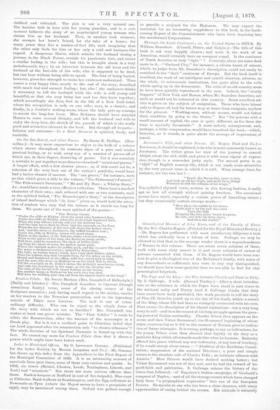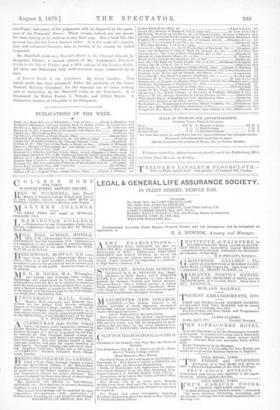The Pope and the King : the War between Church
and State in Italy. By A. Galleuga. 2 vols. (Samuel Tinsley.)—After a short introduc- tion on the relations in which the Popes have stood in past times to the national unity and liberty (and S. Gallenga thinks that they have never been truly patriotic), this work proceeds to tell the story of Pius IX. from his youth up to the clay of his death, within a month of the King, whose life had been so strangely connected with his own. First comes the description of his liberal aspirations—not a very long story to tell—and then the record of his long struggle against the grow- ing power of Italian nationality. Charles Albert then appears on the scone, and then Victor Emmanuel, the ill-omened beginning of whose reign, commencing as it did on the morrow of Novara, gave no indica- tion of future triumphs. It is wrong, perhaps, to say no indications, for the young Prince even then showed that loyalty to his duty as a patriotic King which afterwards made him what he became. Radetzky offered him peace without any war-indemnity, or any loss of territory, if ho would accept these terms :—" Abolition of the Sardinian Consti- tution; suppression of the national Tricolour ; a pure and simple return to the absolute rule of Charles Felix ; an intimate alliance with Austria." Most Princes would have desired nothing bettor ; but Victor Emmanuel was not of that sort, and he had the reward of hie good-faith and patriotism. S. Gallonga relates the history of the times that followed,—of Napoleon's Italian campaign, of Garibaldi's conquest of Naples,—and of all the strange events which have changed Italy from "a geographical expression " into one of the European Powers. He speaks as one who has been a close observer, with many opportunities of seeing behind the scones. His attitude is naturally
anti-Papal, and many of his judgments will be disputed by the parti- sans of the Temporal Power. Those events, indeed, are too recent for their history to be written in any final way. But a book like the present has not the loss a distinct value. It is the work of a capable and well-informed observer, who is candid, if he cannot be called impartial.



































 Previous page
Previous page